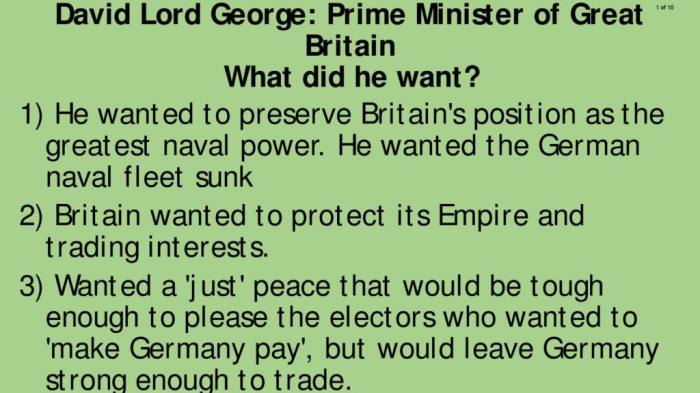The Treaty of Versailles DBQ Answer Key unlocks the intricacies of the pivotal post-World War I settlement. As we delve into its provisions, impact, and international reverberations, we uncover the profound consequences that shaped the course of European history in the 20th century.
The treaty, meticulously crafted by the Allied Powers, aimed to reshape the geopolitical landscape and prevent future conflicts. However, its far-reaching implications left an indelible mark on Germany, fueling resentment and paving the way for the rise of Nazism.
Historical Context
The Treaty of Versailles was signed on June 28, 1919, ending World War I. The war had been a devastating conflict that had claimed the lives of millions of people. The Allied Powers, which included France, Great Britain, and the United States, were determined to prevent another such war from occurring.
The main goals of the Allied Powers in negotiating the treaty were to:
- Punish Germany for its role in starting the war
- Prevent Germany from ever being able to wage war again
- Create a new international order based on the principles of democracy and collective security
Provisions of the Treaty

The Treaty of Versailles was a harsh treaty that imposed severe penalties on Germany. The treaty:
- Required Germany to give up territory to the Allied Powers
- Limited the size of the German military
- Forced Germany to pay reparations to the Allied Powers
- Imposed a “war guilt” clause on Germany, which held Germany responsible for starting the war
Impact on Germany

The Treaty of Versailles had a devastating impact on Germany. The treaty:
- Led to a severe economic crisis in Germany
- Contributed to the rise of Nazism in Germany
- Weakened Germany’s position in the world
International Reactions: Treaty Of Versailles Dbq Answer Key

The Treaty of Versailles was met with mixed reactions from other countries. Some countries, such as France, were pleased with the treaty because it weakened Germany. Other countries, such as the United States, were critical of the treaty because they believed it was too harsh.
The treaty also contributed to international instability by creating a sense of resentment in Germany.
Historical Significance

The Treaty of Versailles was a significant event in world history. The treaty had a profound impact on Germany and on the course of European history in the 20th century. The treaty is often blamed for the outbreak of World War II.
FAQ Corner
What were the key provisions of the Treaty of Versailles?
The treaty imposed significant territorial losses on Germany, including Alsace-Lorraine to France and Eupen-Malmédy to Belgium. It also mandated disarmament, reparations payments, and the creation of the League of Nations.
How did the treaty impact Germany?
The treaty had severe economic, political, and social consequences for Germany. It led to widespread unemployment, hyperinflation, and political instability. The resentment it fostered contributed to the rise of Nazism and the outbreak of World War II.
What were the international reactions to the treaty?
The treaty was met with mixed reactions. Some countries, such as France, saw it as a necessary measure to prevent German aggression. Others, such as the United States, were critical of its harshness and predicted its potential to destabilize Europe.